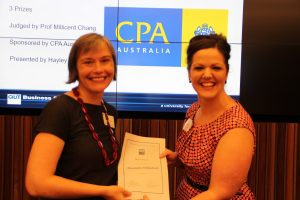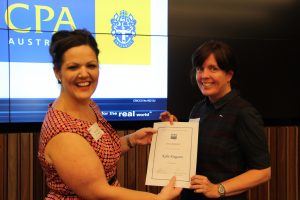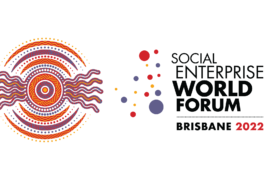 We have two ACPNS champions to celebrate this week!
We have two ACPNS champions to celebrate this week!
Students, Alexandra Williamson and Kylie Kingston won best abstract awards for their papers at the School of Accountancy Higher Degree Research Colloqium held on 1 November 2017.
Have a read of each winner’s abstract below.
An exploration of evaluation as a mechanism for enhancing participation and accountability in not-for-profit organisations by Kylie Kingston
Traditional constructions of accounting and accountability, which are typically embedded in neoliberal logics, privilege the needs of some stakeholder groups ahead of others, and therefore are contributory factors for societal inequalities. From within a critical epistemological position, this research challenges the dominant economic ideology with an aim of creating social change.
Informed by theories of agonistic democracy, dialogic accounting, and transformative participatory evaluation, the motivation of this research is to support the empowerment of marginalised groups by developing participatory evaluation frameworks, for use within not-for-profit organisations. In doing so, service delivery will be strengthened, social justice promoted, and accountability to the beneficiaries of the service increased.
Qualitative case-studies of two not-for-profit organisations will provide the context to explore current practices of beneficiary involvement within accountability and evaluation processes. Data sources will include interviews with three stakeholder groups (board, staff and beneficiaries), secondary data from publicly available documents and publicly available data concerning the legislative environment, of each case. Based upon the analysis and findings, an evaluation framework to be used by the organisation, will be drafted. Beneficiaries will also have a forum to provide feedback upon the draft.
The development of an evaluation framework aimed at giving voice to beneficiaries and increasing accountability to them, has potential societal and practical impacts through the formation of the instrument, the improvement of organisational performance, and the empowerment of beneficiaries through participation within decision-making processes. The research will also contribute to theory development through extending literature on dialogic accounting, accountability and evaluation.
The accountability of public philanthropic foundations by Alexandra Williamson
Accountability, particularly through transparency, is currently of great interest in philanthropy with a focus on best practices, measures and standards. This paper explores the phenomenon of nonprofit accountability in the context of Public Ancillary Funds (PubAFs). PubAFs are interesting entities to examine as they share a legal form, but vary widely in internal factors such as mission and identity; and balance their accountability to external stakeholders including donors and beneficiaries.
Nonprofit organisations including PubAFs receive tax exemptions and concessions, and are thus ‘subsidised’ by taxpayers. Accountability sharpens nonprofits’ focus by enhancing effectiveness and impact, and reducing the risk of scandals and loss of public trust. However, while PubAFs are regulated by the Australian Charities and Not-for-profits Commission and the Australian Taxation Office, other forms of their accountability have been assumed rather than systematically explored.
Using a primarily qualitative approach, relationships between stakeholders, identity, and accountability are examined through Mashaw’s (2006) and Ebrahim’s (2010) frameworks of nonprofit accountability. The unit of analysis is the organisation, with interviews with managers providing perspectives of PubAFs.
Preliminary findings reveal a strong focus on future sustainability. PubAFs that support a single organisation exist in a symbiotic relationship with a shared mission yet different aims. Those supporting cause areas or geographic communities are accountable to mission through the agency of donors. Organisations with a religious auspice interweave accountability closely with their faith. The theoretical contribution will be the extension and refinement of nonprofit accountability theory through a typology of relationships and forms of accountability in PubAFs.




Congratulations Kylie and Alexandra!



